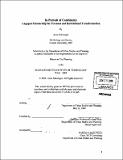In pursuit of continuity : engaged scholarship for personal and institutional transformation
Author(s)
Schwieger, Anne (Anne Margaret)
DownloadFull printable version (7.414Mb)
Alternative title
Engaged scholarship for personal and institutional transformation
Other Contributors
Massachusetts Institute of Technology. Dept. of Urban Studies and Planning.
Advisor
Lorlene Hoyt.
Terms of use
Metadata
Show full item recordAbstract
The historical roles of public service and professional skills education in American planning curriculum has been driven in large part by institutional pressures far removed from practical application or development of new planning knowledge. The placement of scholarship grounded in service and practice along the margins of planning curriculum has led many in the academy, particularly those on planning faculties, to question both its disciplinary and professional basis. Approved by Congress in 1993, the United States Department of Housing and Urban Development's Community Outreach Partnership Center (COPC) grant program sought to provide colleges and universities an actionable means of integrating professionalism and service through collaborative work with communities into their institutional agendas. Conceptions of university-community partnerships are informed largely by the prominent role of universities and community colleges as anchor institutions in the economic, social, and cultural lives of cities. University-community partnerships funded through the COPC program seek to strengthen the capacity of residents and civic leaders to improve the quality of life in their community. Engaged scholarship - the art of "connecting the rich resources of the university to our most pressing social, civic and ethical problems" - is among the most important avenues through which students, faculty and community partners convene around the pursuit of these ends. (cont) The author investigated the notion of mutual benefit through engaged scholarship from the perspective of faculty members, students, community partners and community liaisons as well as her participatory experience within the MIT@Lawrence university-community partnership. Findings show that mutual benefit within these contexts is predicated upon three fundamental ethics of partnership engagement: open, honest dialogue; jointly held understanding of one another's roles and expectations; and understanding and valuing the process.Through this thesis, the author makes a case for a model of student engagement that recognizes the value of "continuity" for achieving personal and institutional transformation. By consistently and continually engaging with university and community partners over a period of two years, she argues, students can play a substantial role in transforming the priorities and functions of institutions of higher education.
Description
Thesis (M.C.P.)--Massachusetts Institute of Technology, Dept. of Urban Studies and Planning, 2008. Includes bibliographical references (p. 106).
Date issued
2008Department
Massachusetts Institute of Technology. Department of Urban Studies and PlanningPublisher
Massachusetts Institute of Technology
Keywords
Urban Studies and Planning.